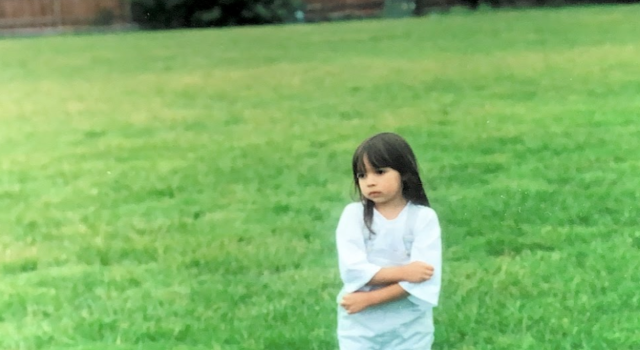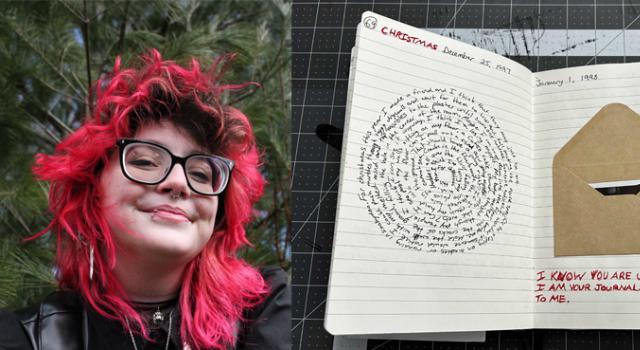Tabita Doujad F20’s Div III Considers Land Relations With Pollinators, Native Plants, and Humans

Tabita Doujad F20 describes their multifaceted ethnographic Div III project exploring more-than-human relations and what they teach in a Land Back decolonial framework.
My Division III is an ongoing multispecies ethnography. Its (very long) title is “Relational Economies, Chestnut Generations: an exploration of situated multispecies relationships among pollinators, native plants, and humans in Cummington, Massachusetts, with a focus on anti-colonial anthropological methodologies and community-driven theories of posthumanism and environmental philosophy.” That title describes much of my work: my Div is a research project mapping the relationships among chestnut trees, pollinator insects — particularly bees and moths — and humans on one stretch of cultivated meadow.
I’m thinking through and writing about how these dynamics have changed in the last several generations via the particular impacts and resonances of settler colonialism, including blight and the lumber trade. To me, engaging in this research from a multispecies ethnography framework meant thinking with others, including the hybrid chestnut trees, who help me think about what it can look like to be a settler and a good neighbor. It means engaging a sort of collaborative ethnography, ethnography that comes from existing relationships, in which I know I am never simply an observer, but instead an active participant whose responsibilities to everyone involved in the research — every bee and chestnut sapling — come out of those existing relationships.
I’m connected to the land that my research takes place on through my found family, Amy and Alice, the meadow’s current caretakers. I met them when I was 18 and came to live and work on Wing and a Prayer Nursery, the pollinator plant nursery that Amy runs from their home. Amy’s work and its vital nature in this critical time for biodiversity has supported much of my thinking and my understanding of what it can look like to love and pay attention to a place and its complex life with everything you are.

Thinking and working in place, as this project about relationships calls for, means I’m thinking about Land Back, how this land can be rematriated in time and what my role might be in that process. I’ve framed my ethnography work as a space for cultivating methods for moving toward the undertaking(s) of land rematriation through the vital interspecies relationships that shape my community’s stories and ways of seeing nonhuman life.
So I’m very interested in thinking with land and other-than-human beings — the kind of practice that in academia gets called environmental philosophy, or posthumanism, but which people have always done and will always do. I’m invested in learning from the perspectives of the common people, my people, those whose labor is situated in place.
I come from a family of beekeepers in the Moroccan Anti-Atlas Mountains and did a self-designed field study the fall semester before my Div III during which I practiced non-extractive ethnography methods with my family to think about how we are connected to that land through plants and bees in a relationship that stretches back far longer than any documented records report. Bees and the plants they give and receive life from literally tie my family to one place. All of our lives are very much inextricable, and we thrive, evolve, and die “in consortia,” as the developmental biologist Scott Gilbert says. Having an intimate knowledge of the resonance of situated plant-insect-human connections in a place I am indigenous to, I felt it was important to bring that reflection to the land I spend much of my time calling home.
And so I arrived at this project with lots of questions about what it means to connect with and love a place as a settler, amid and after colonialism’s ecological destructions, and that’s where thinking about Land Back came in. This is, as you can imagine, ongoing work.

The tangible products of my Div III included a paper drawing on my ethnographic and ecological study and a gallery show with photographs, interview audio, and field sounds gathered throughout the year during my time spent in shared inquiry with Amy. I held this show in the Hampshire College Art Gallery with Otter Jung-Allen F20 and Nadja Mogilewski F20, whose works were, respectively, in poetry (poems that visitors could change!) and biomaterials (gorgeous strange sculptures that age!).
Nadja and Otter inspired me every step of the way. Whereas writing a paper felt like pretty isolated work in some senses, making a gallery exhibit with them was wholeheartedly and consistently collaborative. We met weekly to check in about our work and make gallery choices in unison, and our show, collectively titled Animacies, was a place where we were able to bring together and deepen many of the related themes of our respective Division IIIs.
My committee members are Associate Professor of Anthropology, Literary Arts, and African Studies Nathalie Arnold and Senior Faculty Associate in Film and Photography Kane Stewart. I’ve worked with Kane for almost all four years, and have really grown up as a photographer under his careful eye and supportive nature. And I’ve been particularly lucky to have gotten to work with Nathalie, as she is working in a fairly niche and quickly evolving field as a multispecies ethnographer: precisely the field I was hoping to enter when I came here. Collaborating over shared interests and finding my own path in Div III with Nathalie and Kane has been a true gift.

After graduation, I’m interested in continuing the learning I’ve done here; I’d love to get a graduate degree and continue reading, writing, and thinking in these fields of study. In the immediate future, though, I’m looking for jobs in outdoor education, both in the field and in administrative areas. I’ve worked as a backcountry trips instructor for a while now; my love for connecting people to places and tending to my community’s ethical curiosity — and wonder — has called me to that line of work.
And with my family background and my queer identity, diversifying outdoor spaces is personal and important to me. I’ve taken tons of outdoor programs courses at Hampshire and am particularly interested in risk management, so I’m searching for a job that ties some of these interests and values that I have together. I also hope to thru-hike the Appalachian Trail in the next few years.



